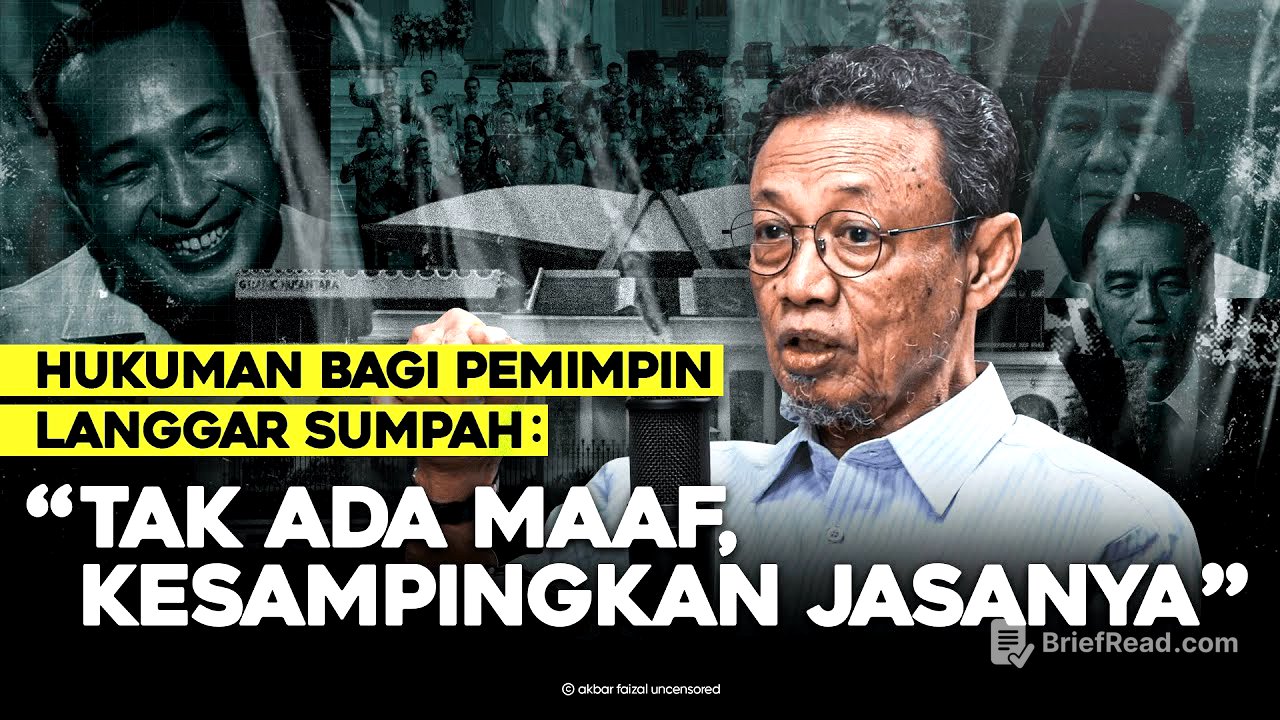TLDR;
This YouTube video features a discussion with Prof. Ryaas Rasyid, former Minister of Autonomy and State Apparatus Empowerment, about the current state of Indonesian governance and civil service. The conversation covers the erosion of constitutional principles, the failure of law enforcement, and the decline of ethical standards in government. They also address the pervasiveness of corruption, the challenges facing the incoming administration, and the need for accountability.
- The discussion highlights a systemic failure in governance, attributing it to leadership, ethical lapses, and a lack of consistent adherence to constitutional principles.
- The conversation emphasizes the importance of ethical leadership, adherence to the constitution, and the need for accountability in governance to prevent further damage to the nation's future.
- The discussion calls for a critical evaluation of past and present administrations, including the role of political elites and the need for systemic reforms to address corruption and ethical lapses.
Intro [0:00]
Akbar Faizal introduces the discussion by stating that the current state of Indonesia is back to square one, with almost nothing left from the reform era. He expresses suspicion of a grand conspiracy that brought Jokowi to the presidency, considering it illogical. He also criticizes the idea of free meals as an insult to the nation, suggesting it highlights the people's inability to afford food.
The Deterioration of Governance and the Role of Leadership [3:24]
Prof. Ryaas Rasyid agrees that Indonesia is in a state of severe decline, making it difficult to recover. He attributes the damage to failures in leadership, emphasizing that improvements must start there. He stresses that governance is a collective effort requiring competent individuals with integrity, vision, and consistency. He points out that the legal system is collapsing, the economy is struggling, administration is chaotic, and policies lack direction.
Constitutional Principles and Their Violation [6:18]
Prof. Ryaas Rasyid explains that the pillars of a strong nation are the constitution, law, and ethics, all of which must be upheld. He notes that the constitution, representing the agreement to form a nation, is being betrayed and not consistently followed. Pancasila, the state ideology, is not present in daily life and has failed to become a living ideology. He argues that the government is not adhering to the constitution, with leaders lying, betraying, and creating confusing policies, thus failing to educate the nation.
Failed Attempts to Extend Presidential Terms [9:48]
Akbar Faizal brings up the unacknowledged plans by President Jokowi's administration to extend the presidential term, either through adding a third term, extending the term due to COVID-19, or postponing elections. Prof. Ryaas Rasyid responds that such ideas reflect a misunderstanding of governance and a lack of vision. He asserts that extending terms to cover up failures is illogical and betrays the constitution.
The Failure of Law Enforcement and the Hope for Future Accountability [13:24]
Prof. Ryaas Rasyid emphasizes the importance of holding those accountable for legal violations and controversial policies. He insists that President Jokowi should be held responsible for any wrongdoings even after his term ends. While Akbar Faizal is skeptical, Prof. Ryaas Rasyid believes that public demand for justice can overcome political consolidation. He expresses hope that Prabowo, as the new president, will be stricter and ensure that past issues are addressed to avoid burdening future generations.
Ethical Standards and the Erosion of National Pride [17:27]
Akbar Faizal and Prof. Ryaas Rasyid discuss the erosion of ethical standards in governance and its impact on national pride. They agree that current actions will be judged by future generations, who will have a clearer view of the issues. Prof. Ryaas Rasyid points out that at the end of the New Order era, there was an awareness of the need to review the system.
Reviewing the Political System and the Failures of Reform [19:04]
Prof. Ryaas Rasyid recalls being appointed to lead a team to review the political system, including elections, political parties, and regional governance, at the end of the New Order era. He mentions that under President Habibie, they corrected the single-principle policy, opened up the possibility of more than three political parties, and reduced the role of the military in parliament. However, these changes were not adequately maintained, leading to increased corruption and nepotism within parties and government.
Hegemony of Political Parties and the Disappointment with Key Institutions [24:58]
Akbar Faizal and Prof. Ryaas Rasyid discuss the excessive influence of political parties in various sectors, such as the selection of constitutional judges. Prof. Ryaas Rasyid notes that while the process is formally similar to that in the United States, the practice is different, with bargaining and a lack of maturity. He expresses disappointment with the Constitutional Court (MK), stating that it has never made a decision different from the General Elections Commission (KPU) in presidential election disputes.
The Pervasiveness of Money Politics and the Erosion of Democracy [29:14]
Prof. Ryaas Rasyid laments the increasing prevalence of money politics, which has distorted democracy and eroded national character. He notes that even parties once perceived as clean now require candidates to prepare funds for mobilization and witnesses. He argues that this situation reflects a deep moral decline and confirms that many people are unemployed and dependent on such practices for survival.
The Need for Honesty and Ethical Governance [34:21]
Akbar Faizal and Prof. Ryaas Rasyid discuss the need for honesty and ethical governance. Prof. Ryaas Rasyid emphasizes that the government has lost its pillars, with the constitution, law, and ethics all compromised. He highlights the lack of a law on governmental ethics, which he has been advocating for since 1995, to sanction officials for lying or appointing incompetent individuals. He argues that appointing individuals without competence or integrity is a betrayal of the people.
The Failures of the Jokowi Administration and the Role of Conspiracy [39:16]
Akbar Faizal states that the worst damage in the republic's history has occurred in the last 10 years under the Jokowi administration. Prof. Ryaas Rasyid suspects a grand conspiracy that brought Jokowi to the presidency, finding it illogical for a mayor of Solo with minimal experience to become governor of Jakarta and then president. He claims that Jokowi lacked the personal capacity to win without a large syndicate working for him.
Challenges for the Incoming Administration and the Importance of Competence [45:23]
Akbar Faizal and Prof. Ryaas Rasyid discuss the challenges facing the incoming administration under Prabowo, especially with the vice president being the son of President Jokowi. Prof. Ryaas Rasyid hopes Prabowo will take the best actions to resolve the problems. He notes conflicting statements about the new cabinet, with some saying it will be based on competence and others suggesting it will accommodate former opponents. He warns against oversimplifying the issue and prioritizing accommodation over competence.
Accountability for Past Wrongdoings and the Burden of Debt [49:10]
Prof. Ryaas Rasyid argues that those who contributed to past wrongdoings must be held accountable. He suggests investigating the conspiracy behind Jokowi's rise to power and those who enabled his administration's misdeeds. He also emphasizes the heavy burden of debt inherited by the new administration. He criticizes the idea of free lunch programs, calling it an insult to the nation and a strain on the state budget.
The Importance of Ethical Leadership and Rejecting the Free Lunch Program [54:36]
Prof. Ryaas Rasyid asserts that in governance, there is no excuse for wrongdoing, regardless of good intentions. He argues that leaders are sworn to do good, and failure to do so is a violation of their oath. He questions the benefits of infrastructure projects under Jokowi, noting the economic struggles of ordinary people. He also criticizes the free lunch program as unsustainable and a reflection of the nation's failure to provide for its citizens.
Concluding Remarks and Hopes for the Future [59:36]
Akbar Faizal thanks Prof. Ryaas Rasyid for the discussion and expresses hope that the incoming administration will address the identified issues. Prof. Ryaas Rasyid emphasizes that the new president should have a clear roadmap of problems, opportunities, and challenges, and that the team supporting him must understand his vision. He concludes by stressing the need to halt damaging practices, hold wrongdoers accountable, and continue good policies for the betterment of the nation.









